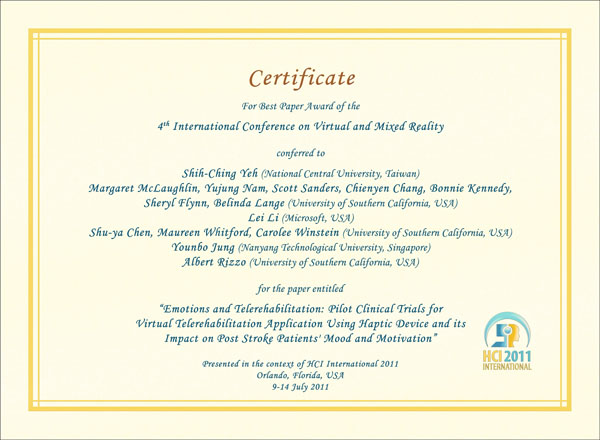

Virtual and Mixed Reality

Best Paper Award for the 4th International Conference on Virtual and Mixed Reality, in the context of HCI International 2011, 9-14 July 2011, Orlando, Florida, USA

Certificate for Best Paper Award of the 4th International Conference on Virtual and Mixed Reality
conferred to
Shih-Ching Yeh (National Central University, Taiwan)
Margaret McLaughlin, Yujung Nam, Scott Sanders, Chienyen Chang, Bonnie Kennedy, Sheryl Flynn, Belinda Lange
(University of Southern California, USA)
Lei Li (Microsoft, USA)
Shu-ya Chen, Maureen Whitford, Carolee Winstein (University of Southern California, USA)
Younbo Jung (Nanyang Technological University, Singapore)
Albert Rizzo (University of Southern California, USA)
for the paper entitled
"Emotions and Telerehabilitation: Pilot Clinical Trials for Virtual Telerehabilitation Application Using Haptic Device and its Impact on Post Stroke Patients' Mood and Motivation"
Presented in the context of HCI International 2011
Orlando, Florida, USA, 9-14 July 2011
Paper Abstract
"We describe a pilot clinical trial with a flexible telerehabilitation platform that allows a therapist to remotely monitor the exercise regimen and progress of a patient who previously suffered from a stroke. We developed virtual game environments which were host to a progressive set of training tasks from precise fine motor movements to reaching movements that involve full arm and shoulder activity. Concurrently, the therapist monitored the progress of the patient through a video channel. Assessment of psychosocial variables show that negative feelings (confusion, t(13)=2.54, p<.05, depression t(13)=2.58, p<.05, and tension, t(13)=2, p<.1) were significantly lessened after the game play. Patients’ overall satisfaction with the telerehabilitation system was positively correlated with the feeling of co-presence of the therapist, r(8)=.770, p<.005. Patients felt less efficacious in continuing therapy after participating in the telerehabilitation game compared to their reported perseverance self-efficacy before the game, t(5)=2.71, p<.05 and showed decreased willingness to persist in therapy regardless of fatigue after the game play, t(5)=2.67, p<.05. However, when patients’ pretest mood scores were taken into account, this trend was reversed. Patients’ active mood before the game was positively correlated with their willingness to persist in the therapy after the game, r(14)=.699, p<.005. Telerehabilitation significantly enhanced stroke patients’ psychological states."
The full paper is available through SpringerLink, provided that you have proper access rights.

